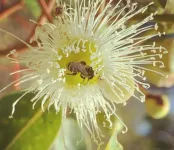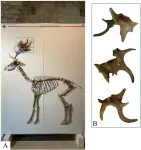(Press-News.org)
Maternal antibodies passed across the placenta can interfere with the response to the malaria vaccine, which would explain its lower efficacy in infants under five months of age, according to research led by the Barcelona Institute for Global Health (ISGlobal), in collaboration with seven African centers (CISM-Mozambique, IHI-Tanzania, CRUN-Burkina Faso, KHRC-Ghana, NNIMR-Ghana, CERMEL-Gabon, KEMRI-Kenya). The findings, published in Lancet Infectious Diseases, suggest that children younger than currently recommended by the WHO may benefit from the RTS,S and R21 malaria vaccines if they live in areas with low malaria transmission, where mothers have less antibodies to the parasite.
The world has reached an incredible milestone: the deployment of the first two malaria vaccines -RTS,S/AS01E and the more recent R21/Matrix-M- to protect African children against malaria caused by Plasmodium falciparum. Both vaccines target a portion of the parasite protein called circumsporozoite (CSP) and are recommended for children aged 5 months or more at the moment of the first dose.
“We know that the RTS,S/AS01E malaria vaccine is less effective in infants under five months of age, but the reason for this difference is still debated,” says Carlota Dobaño, who leads the Malaria Immunology group at ISGlobal, a centre supported by “la Caixa” Foundation.
To investigate this, Dobaño and her team analysed blood samples from more than 600 children (age 5-17 months) and infants (age 6-12 weeks) who participated in the phase 3 clinical trial of RTS,S/AS01E. Using protein microarrays, they measured antibodies against 1,000 P. falciparum antigens before vaccination to determine if and how malaria exposure and age affected IgG antibody responses to the malaria vaccine.
“This microarray approach allowed us to accurately measure malaria exposure at the individual level, including maternal exposure for infants and past infections for older children,” says Didac Maciá, ISGlobal researcher and first author of the study.
The role of maternal antibodies
The analysis of antibodies to P. falciparum in children who had received a control vaccine instead of RTS,S/AS01E revealed a typical “exposure” signature, with high levels in the first three months of life due to the passive transfer of maternal antibodies through the placenta, a decline during the first year of life, and then a gradual increase as a result of naturally acquired infections.
In children vaccinated with RTS,S/AS01E, antibodies induced by natural infections did not affect the vaccine response. However, in infants, high levels of antibodies to P. falciparum, presumably passed from their mothers during pregnancy, correlated with reduced vaccine responses. This effect was particularly strong for maternal anti-CSP antibodies targeting the central region of the protein. Conversely, infants with very low or undetectable maternal anti-CSP IgGs exhibited similar vaccine responses as those observed in children.
The molecular mechanisms underlying this interference by maternal antibodies are not fully understood, but the same phenomenon has been observed with other vaccines such as measles.
Overall, these findings confirm something that was already suspected but not clearly demonstrated: despite their protective function, maternal anti-CSP antibodies, which decline within the first three to six months of life, may interfere with vaccine effectiveness. The higher the level of malaria transmission, the more maternal antibodies are transmitted to the baby, resulting in lower vaccine effectiveness. These findings further suggest that infants below five months of age may benefit from RTS,S or R21 vaccination in low malaria transmission settings, during outbreaks in malaria-free regions, or in populations migrating from low to high transmission settings.
“Our study highlights the need to consider timing and maternal malaria antibody levels to improve vaccine efficacy for the youngest and most vulnerable infants,” says Gemma Moncunill, ISGlobal researcher and co-senior author of the study, together with Dobaño.
This study was supported by the National Institute of Allergy and Infectious Diseases, part of the National Institutes of Health through grants R01AI095789 and U01AI165745.
Reference
Macia D, Campo JJ Chenjerai J et al. The effect of Plasmodium falciparum exposure and maternal anti-circumsporozoite protein antibodies on responses to RTS,S/AS01E vaccination in infants and children: an ancillary observational immunological study to a phase 3, randomised clinical trial . Lancet Inf Dis. 2024. https://doi.org/10.1016/S1473-3099(24)00527-9
END
Teaching needs to be made more attractive to a wider pool of graduates to tackle shortages in the profession, according to new international research comparing 18 countries.
The worldwide comparison led by Durham University, UK, shows that the level of pay relative to other graduate professions, lack of resources and poor student behaviour all play a part in recruitment and retention issues.
Popular quick-fix strategies used across the world to attract and retain teachers, such as bursaries, scholarships and ...
Latest research has revealed a “positive association” between the number of properties listed as Airbnb rentals and police-reported robberies and violent crimes in thousands of London neighbourhoods between 2015 and 2018.
In fact, the study from University of Cambridge and the University of Pennsylvania suggests that a 10% increase in active Airbnb rentals in the city would correspond to an additional 1,000 robberies per year across London.*
Urban sociologists say the rapid pace at which crime rises in conjunction with new rentals suggests that the link is related more to opportunities for crime, rather than loss ...
A new report by researchers from the University of Cambridge and the London School of Economics and Political Science (LSE) argues the UK government should invest in green infrastructure now or watch productivity lag behind China, the United States and other countries already running away with the benefits.
Is reaching net zero a growth and prosperity plan? by former Head of Economic Forecasting at the UK Treasury, Dimitri Zenghelis, says the government’s self-imposed rules on infrastructure investment must be modernised to spur the innovation needed for UK prosperity.
The ...
New Curtin-led research has revealed Marri trees are critical to the survival of more than 80 species of native bee in Western Australia’s South West region, which is one of the world’s most biologically rich but threatened biodiversity hotspots.
Lead author Dr Kit Prendergast, Adjunct Research Fellow from the Curtin School of Molecular and Life Sciences, said the study identified the Marri (Corymbia calophylla), which is native to the South West and was named a ‘near threatened’ species in 2019, as a crucial supplier of food for native bees and supporter of the region’s ecosystem.
“The findings that these trees support at ...
Barcelona, Spain: Drugs designed to target HER2-postive breast cancer could also benefit some patients with bile duct cancer, according to results of a patient trial to be presented on Thursday at the 36th EORTC-NCI-AACR [1] Symposium on Molecular Targets and Cancer Therapeutics in Barcelona, Spain. Bile duct cancer is rare, treatment options are limited, and the survival rates are low.
The trial also suggests that a wider group of breast cancer patients – those with HER2-mutated breast cancer – could be treated with these ...
Study focused on ‘Goldilocks Gene’ CHD2 that causes autism and epilepsy
Deletion of long non-coding RNA CHASERR produces too much CHD2 protein in the cell, leaving patients wheelchair-bound, nonverbal and with intellectual delays
Patient’s dad from study: ‘We intuitively understood this was a lot bigger than just Emma’
‘It is mind-boggling that we only know what 1% of the human genome does’
CHICAGO --- When a gene produces too much protein, it can have devastating consequences on brain development and function. ...
BUFFALO, N.Y. — Millions of Americans use cannabis to treat a plethora of health conditions. They are rarely under a health care provider’s supervision and their access to quality information about the substances they are consuming and their potential risks is limited at best.
A paper published today in the American Journal of Public Health, the official journal of the American Public Health Association, by University at Buffalo researchers calls attention to this concerning and potentially dangerous situation, which they say is a result of a policy environment historically driven by politics, not science.
The paper explains why there needs to be a shift in cannabis ...
EMBARGOED FOR RELEASE UNTIL 4 P.M. ET, WEDNESDAY, OCTOBER 23, 2024
MINNEAPOLIS – In middle-aged people, having risk factors like blood pressure, blood sugar and cholesterol that are not well-controlled combined with not following certain healthy habits including exercise, diet and sleep, are linked to a higher risk of stroke, dementia or depression later in life, according to a study published in the October 23, 2024, online issue of Neurology®, the medical journal of the American Academy of Neurology. These results do not prove that not having healthy habits increases the risk of these conditions, ...
EMBARGOED FOR RELEASE UNTIL 4 P.M. ET, WEDNESDAY, OCTOBER 23, 2024
MINNEAPOLIS – People in early middle age who have poor sleep quality, including having difficulty falling or staying asleep, have more signs of poor brain health in late middle age, according to a study published in the October 23, 2024, online issue of Neurology®, the medical journal of the American Academy of Neurology. The study does not prove that poor sleep accelerates brain aging. It only shows an association between poor sleep quality and signs ...
Fossils from more than 600,000 years ago reveal how Southern Europe’s animal community shifted between warm and cold climate fluctuations, according to a study published October 23, 2024 in the open-access journal PLOS ONE by Beniamino Mecozzi from the Sapienza Università di Roma, Italy and colleagues.
The Notarchirico site has long been valued as a source of information on the Early-Middle Pleistocene, with fossils stretching from around 695 thousand to 614 thousand years ago. The authors of the present study examined mammalian fossils at the site and how they might ...




